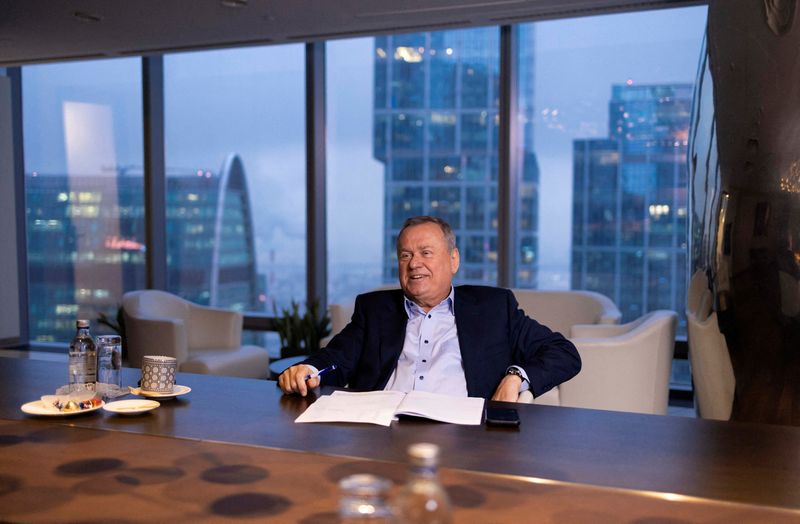By Elena Fabrichnaya and Gleb Bryanski
MOSCOW (Reuters) -Russia’s sanctions-hit, militarized economy is expected to slow next year and banks’ profits will fall, while the benchmark interest rate may climb to 23% by the end of this year, Andrei Kostin, CEO of Russia’s second-largest lender, VTB, said.
Kostin predicted that GDP growth will slow to 1.9% in 2025, above the International Monetary Fund’s forecast of 1.3%. The government expects the economy will grow by 3.9% this year. He said inflation will slow to 6.4% from the current 8.5%.
“The war has been going on for almost three years, and a huge number of sanctions have been imposed. We are living in an absolutely unusual situation,” Kostin told Reuters in an interview late last week. One third of the state budget was going to the military, he added.
“It is impossible for the economy to go through such events without consequences. But the country has been living for three years, there is economic growth, and overall a healthy economy,” he said.
Kostin cautiously criticized the central bank’s hawkish monetary stance, saying the current inflation rate did not require a benchmark interest rate “three times this level”.
Kostin, who worked in the Soviet embassy in Britain in the 1980s, likened Russia’s central bank governor Elvira Nabiullina to British 20th century Prime Minister Margaret Thatcher, who was dubbed the “Iron Lady”.
“I am, of course, not as much of a monetarist and believe that an inflation rate of 8.5% is not so critical for Russia, it could be tolerated,” he said.
KEY RATE NOT FULLY EFFECTIVE
Kostin said that Western sanctions, high spending on the military, state subsidies on many loans and elevated high inflationary expectations made the benchmark interest rate, which is at the highest level since 2003, less effective.
“In the context of high military expenditures and sanctions, an instrument like the key interest rate may not be fully effective in managing inflation,” Kostin said.
He said the Russian rouble will stabilise at around 100 to the dollar after a period of volatility. The rouble lost 15% against the U.S. dollar after the latest round of U.S. sanctions last month hit third largest lender Gazprombank, which handled Russia’s energy trade with Europe.
Kostin said that with current interest rates, overall lending growth will slow to 10% next year from 20% in 2024 while Russian banks will not be able to earn as much next year as they did in 2024. He said that VTB’s profit will fall by 27% in 2025.

